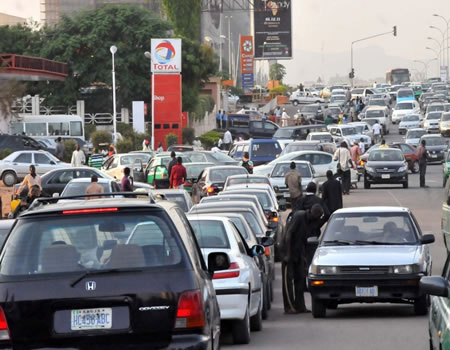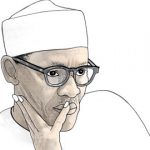The seeming new template is against the official seal of N145 a litre, which has been a source of disagreement between the authorities of the Nigerian national Petroleum Corporation (NNPC) and a majority of the independent marketers, who operate the bulk of the retail outlets across the country.
Though the filling stations of the major marketers that had supply of petrol sold at N145 per litre, a large number of motorists and other customers spend many hours to have their turns sometimes to no avail.
A survey conducted by our correspondents revealed the frustration of prospective customers even at the new price regime in some states, as they had to give station attendants tips before they could procure the product largely because of inadequate stock.
In a few cases, prospective customers were asked to purchase lubricating oils before they could be allowed to buy petrol into their vehicles.
Only two petrol stations sell at the recommended N145 per litre in Ekiti State, and one of them is an independent marketer, while the other is the NNPC Mega Station at Iworoko Road.
All the other stations sold the commodity for prices ranging from between N180 and N200, even as most petrol stations in Ado Ekiti that had the product at N180 were identified by the length of the queue there, while those that sell for N145 have long queues.
In Kogi State, majority of the filling stations did not have the product on Saturday whereas the few that had supply sold a litre of petrol for between N220 and N230 in the state capital, Lokoja.
In Kwara state, the black market price was between N300 and N400 per litre, while at the few independent filling stations, the commodity was sold for N120 per litre at night, ostensibly to avert possible sanctions by the Depart of Petroleum Resources (DPR).
In Abeokuta, the Ogun State capital, major marketers dispensed petrol at N145 per litre, while some independent marketers sold it at between N180 and N200.
The scarcity of the product, especially the state capital, had continued to worse with the attendant as astronomical rice in transport fare and food items.
Reports from Bauchi State indicated that the product could hardly be come-by at most filling stations, while the only source of supply was the black market where a litre went for N220 per litre.
The price in other towns in the state like Idah, Anyigba, Ankpa was between N240 and N250 per litre.
The price range in Calabar, the Cross river State capital was between N150 and N190 per litre, as against between N230 and N250 per litre in Delta State.
According to findings in Osun State, a litre is selling for between N180 and N190 per litre, and in Kaduna State where life has almost become miserable for most commuters because of the spiraling effects of the fuel scarcity, a litre went foN220.
In Kano State, operators of black markets are still having a field day, as four litres of petrol goes for between N900 and N1000, that is, N250 per litre.
Speaking with our correspondents, some Nigerians have lamented that the new price might have come to stay, blaming government of complicity in the ongoing hardship they were experiencing in the hands of petroleum marketers.
Mrs Hauwa Musa, who identified herself as a trader, while speaking with Sunday Tribune in Lokoja, the Kogi State capital, said: “Despite the insistence by government that it has not increased fuel price, we are now buying the product for N220 to N230. It is really sad that we are being made to go through the extortion and hardship while government continues to maintain that the official price remains the same.”
Also speaking, Mr Sam Inyang told our correspondent in Calabar that the people had resigned to fate and were already buying the product for between N150 and N190 per litre.






